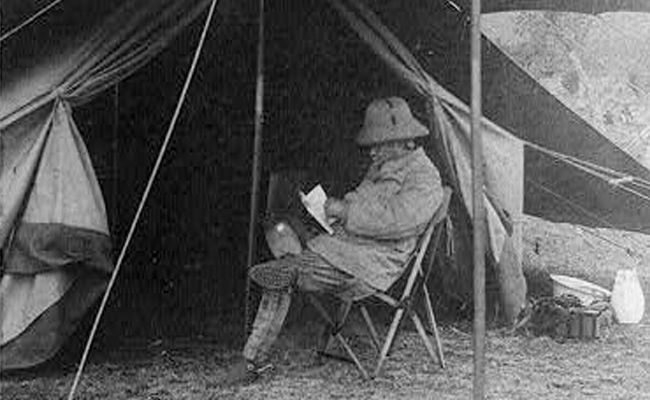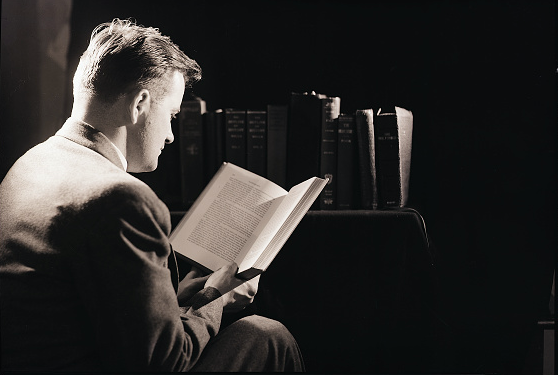
It’s rare that I read a book without a pencil in hand, eager to underline and take notes and think about ways I can turn that reading into some practical benefit. Would this author be good on the AoM podcast? Is there anything in here that would make good source material for an article? Should I be writing down that interesting nugget about how [figure from history] spent their free time?
In short, most of my reading is done with its utility in mind.
I’m certainly not the only one. It’s a trend I’ve seen more and more of, and have become more and more disenchanted with. I spend a lot of time on the bookish internet — book blogs, #bookstagram, author interviews on podcasts — and one thing that’s become pretty clear is that a lot of people, especially guys, have this idea that reading is pretty much only good for its applicable use. It’s merely a tool for becoming a better, more productive person, making more money, and/or moving up the ladder (either in your career, or your life in general).
Bah humbug to that!
Today, I’m making the case for taking back the idea of reading for sheer pleasure — for bringing Romance back to the written word.
Embrace Reading for the Sake of Reading
The self-help internet has instrumentalized nearly everything that makes life enjoyable. Every activity is to be done with some specific purpose in mind. You’re supposed to maximize the ROI of your free time so that it’s not just refreshing, but also makes you a better (read: more productive) person.
You should get plenty of sleep so you can be your most effective at work; pursue a hobby so you can be more recharged for work; take a walk so you can be more inspired at work.
This trend has thoroughly infiltrated the realm of reading as well. We’re supposed to read books on business, books on leadership, books on self-development to become the best entrepreneur, boss, or employee we can be. A more well-rounded citizen. A better husband and father. We’re even supposed to read fiction for its concrete benefits; research shows that novels make you more empathetic and creative!
These are hardly bad aims, but there’s also an argument for sometimes pursuing leisure for leisure’s sake. As its own Good, without the need for any other rationalizations.
And there’s an argument for reading for reading’s sake. For spending time with books for no other reason but enjoyment, pleasure — even simply their sheer beauty.
Think about what happens when you go to an art museum. You wander around, looking at pieces of art, unmoved by some, but caught enraptured and unable to look away by others. You aren’t asking, “Are there practical takeaways from this art I’m looking at?” You’re letting the impression it makes wash over you. You’re wondering what moved the artist to paint a particular brush stroke. You’re admiring the craft and skill of their work. You’re wondering what it is that so entrances you. Above all, you’re just enjoying it. Things that are beautiful inherently bring light to the soul and the psyche.
This is true for any work of art — books included. Most authors spend years crafting their characters, agonizing over every sentence, arranging paragraphs and dialogue in just the right way. And it’s not just novelists — you can’t read the likes of Robert Caro, Candice Millard, Erik Larson, and so many more, without seeing the art and craft of their books.
If you go into a book with the mindset that you’re simply enjoying a work of art, your mind is freed from the need to find the utility in it. It can be enriching and edifying (though in no specific direction and without quantifiable benefit). It can also be just plain entertaining. Consuming art, from paintings and sculptures to movies and books, isn’t just heady, it’s also fun! An escape. And using art — including books — to find that escape, is okay. It’s more than okay, in fact, it’s necessary.
This isn’t to say that you can’t learn something from books while enjoying their diversionary beauty. Learning is its own pleasure — one that you can pursue for the pleasure alone, with no real end in mind. No practical use, no career or personal development application, no note-taking to review later on, just as its own “useless” Good.
I hereby give you permission to put down the highlighter and let your brain wander freely through a book, without the intent of finding applications for what you’re taking in. Let yourself read with no ulterior motives and embrace the simple pleasure that comes from losing yourself in a text.
To follow what I’m personally reading (for both work AND pleasure), subscribe to my weekly newsletter.
Also be sure to listen to our podcast with Zena Hitz for even more on the idea of learning for its own sake:







